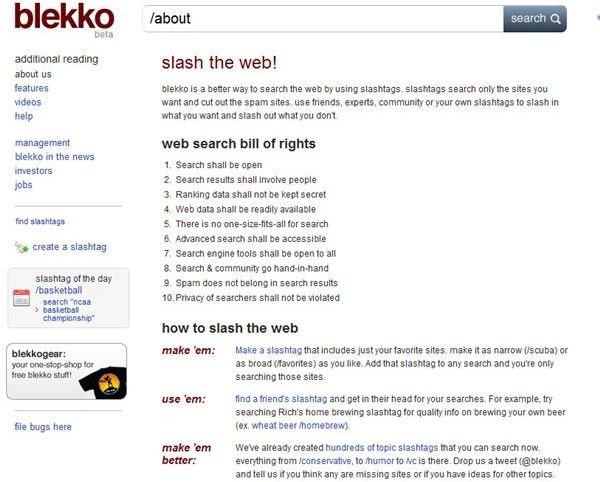Innovations in Web Search: Blekko Crowd Sourced Search
The Current Search Market
Looking at the numbers for current search market share, the news isn’t great for the search engines that consider themselves Google’s main competitors. Google still holds 85% of the market, with Yahoo, Bing, Baidu and Ask sharing approximately 14%. While they’ve made small inroads into Google’s domination compared to two or even three years ago, the numbers have been basically flat for the past year. There has been a little bit of jostling for position - Bing, for example, has gained roughly a 1% market share at the expense of Yahoo - but none of them have significantly reduced Google’s iron grip on search (1).
Bing, Yahoo and Ask aren’t really doing anything that differently from Google. Their ranking algorithms are different and they may have a slightly different focus, but all take the same basic approach: to index as much of the web as they can and provide one single search interface (with advanced options) to produce the most effective results list possible. Ultimately, the results lists are impacted by the same problems: a glut of spam, and increasingly savvy marketers and content creators working SEO for all it’s worth.
Alternate Approaches to Search
So what are the search engines that are taking an innovative approach to search, and how are they trying to differentiate themselves? Some of the approaches that stand out include: crowdsourced relevancy criteria (e.g. Blekko); direct human-powered search (e.g. ChaCha); clustering engines (e.g. iBoogie, Yippy); discovery Engines (e.g. Evri); and vertical search (e.g. A9)
Blekko: Crowdsourced Relevancy Criteria
Of all of these, Blekko’s approach is perhaps the most interesting. Blekko uses slashtags to group searches by topic, or to limit the results to certain types of site. For example, searching ipad2/techblogs will only pull results from technology bloggers, thus eliminating the spam, ecommerce sites, and low quality reviews and forum posts that litter the SRPs (Search Results Pages) of Google and the other search behemoths. Blekko has garnered largely positive reviews for its approach, albeit with a few detractors who find it slow and hard to use. The SRPs themselves are impressively relevant when a slashtag is used appropriately. And therein lies Blekko’s main difficulty: while it has undoubtedly found a way of increasing the relevance of its results, it lacks the simplicity of a simple search box waiting for a keyword or two. Admittedly the slashtag system is straightforward as soon as you start to use it, but to a novice user the explanations are still daunting and there’s no question that it requires a little more effort on the user’s part than just typing in the first word that comes into their mind.
It will also be interesting to see how Blekko manages the crowdsourced aspect of its search strategy; especially the growing volume of slashtags from users, and the varying number and quality of sites that are included in each slashtag. If Blekko captures the popular imagination (and early results seem promising) (2) it will also be interesting to see if the slashtag equivalent of SEO will develop.
Search Innovators: Blekko, ChaCha and Evri


ChaCha: Guided Search or Fact Finder?
ChaCha also believes in a human-aided approach to search, but has struggled to find a successful business model. Their early guided chat search was not a success, with problems including numerous prank callers and poor assistance from the guides. In 2008 they abandoned regular guided search to focus on the mobile market, and they continue to provide human-powered assistance via SMS and their website. Although ChaCha has outlived Google’s foray into human-aided search, Google Answers, it seems unlikely that they will be able to scale up sufficiently to provide a serious challenge to Google. To date they are not available outside the US or on all cellular networks, and general consensus appears to be that their service is more of a “quick fact finder” than a full search tool.
Evri: Semantic Discovery Engine
Lying in between the crowd-sourced approach of Blekko and the human-guided search of ChaCha is Evri, which bills itself as a discovery engine. Evri uses semantic language processing to build connections between content on the web, locating related or relevant content to present to the user. Experimenting with Evri reveals a site that, while a little messy and limited in focus, provides useful and relevant results that demonstrate the success of the approach. Evri’s main limitation is a daunting interface for novice or new users, meaning that in its current form it is likely to remain a niche tool for those reasonably confident with navigating the web.
iBoogie and Yippy: Clustering By Topic
Clustering engines such as iBoogie and Yippy take a simple but effective approach to search. Instead of presenting one single list of ranked results, they group search results by topic. This immediately cuts out an enormous amount of chaff for the searcher. There are a few of these clustering engines, and their great advantage is that they provide a straightforward interface with a simple, intuitive way of drilling down and grouping results. In spite of this, clustering engines have limited traction in the search market. This appears to be in part due to a tendency to lump them in with earlier, less successful metasearch engines; and partly because many of the more advanced clustering engines are commercial.
A9: Vertical Search
Vertical search engines such as those produced by A9 (an Amazon subsidiary) focus on specific areas of online content such as product search, health information, etc. Vertical search engines greatly improve the relevance of SRPs because by their very nature, they are designed only to search pages of interest to a specific audience. However, Google has been in on the vertical search market from the start with tools such as Google Product Search and even Google Custom Search, which allows end users to develop their own vertical search engines. This will inevitably limit the opportunities for other players in the market to gain traction.
What Comes Next?
Currently, these niche search engines and search innovators hold approximately 1.3% of the search market: a tiny amount compared to the big names of traditional search. However, with Google’s recent algorithm update (designed to improve the relevancy of SRPs) garnering very mixed reviews, and few serious competitors with a significantly better set of SRPs to offer, the time may be right for a company with a completely different approach to make their mark.
Search Innovators: Yippy, iBoogie, and A9



(1) Netmarketshare. https://marketshare.hitslink.com/search-engine-market-share.aspx?qprid=5 (2) Van Grove, Jennifer. Anti-spam search engine Blekko averaging 1 million queries per day. https://mashable.com/2011/02/07/blekko-queries/ (3) Screenshots by author
